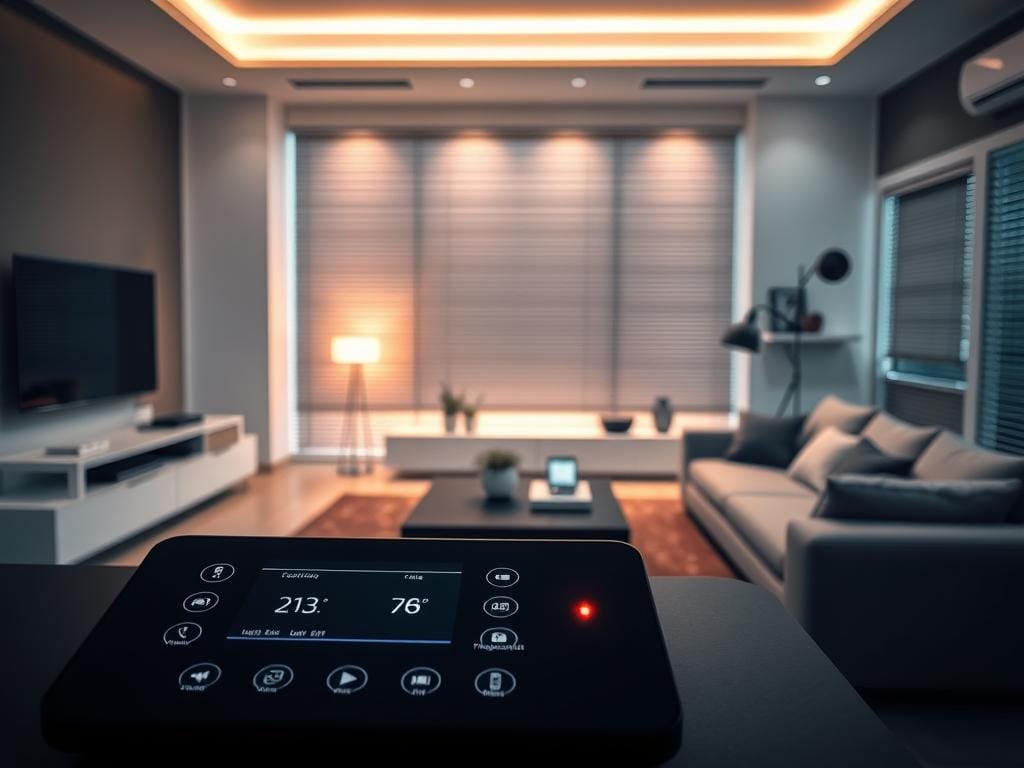Artificial intelligence is now a big part of our lives. It’s estimated that over 45% of households in the United States will use smart home technology by the end of the year.
AI is changing how we think about security and convenience at home. With Connected Home systems, you can watch your home from anywhere. You’ll get alerts about any security issues. You can also control lights and temperature to make your home safer and save energy.
Key Takeaways
- AI is increasingly being used in home security systems to enhance safety and efficiency.
- Connected Home technology allows for remote monitoring and control of home security.
- Smart home devices can automate various tasks, making life more convenient.
- The use of AI in home security is expected to grow significantly in the coming years.
- Homeowners can benefit from enhanced security features and energy efficiency.
Understanding Smart Home Security Systems
In today’s world, smart home security systems are changing how we feel safe at home. They use Artificial Intelligence (AI) to offer better protection than old security methods.
What Is Smart Home Security?
Smart home security uses advanced tech to keep homes safe from intruders and damage. It includes devices and systems that can be controlled from anywhere. This gives homeowners updates and alerts in real-time.
Looking to improve your home’s security without spending a lot? There are affordable gadgets and tips out there. Check out building a smart home on a budget to find ways to save.
Key Components of Smart Security
Smart security includes smart cameras, door locks, alarm systems, and sensors. These work together to cover your home fully.
| Component | Function |
|---|---|
| Smart Cameras | Monitor and record activity around the home |
| Smart Door Locks | Control access to the home remotely |
| Alarm Systems | Alert homeowners to possible threats |
| Sensors | Detect movement and changes in the environment |
Benefits of Smart Home Security
Smart home security offers many benefits. It provides better security, convenience, and peace of mind. With AI, you get 24/7 monitoring and real-time alerts to stay updated on your home’s status.
By adding smart security devices, you create a strong security system that fits your needs. This not only makes your home safer but also increases its value.
The Role of Artificial Intelligence in Security
AI plays a big role in making homes safer. It does this by analyzing things in real-time, spotting threats before they happen, and learning from patterns. Knowing how AI works and its benefits is key when you’re thinking about upgrading your home’s security.
How AI Technology Works
AI in home security, like in Wireless Security Cameras, uses smart algorithms to check video feeds constantly. Unlike old cameras, AI cameras can spot objects, people, and odd happenings. This is a big step forward in Home Automation, making security smarter.
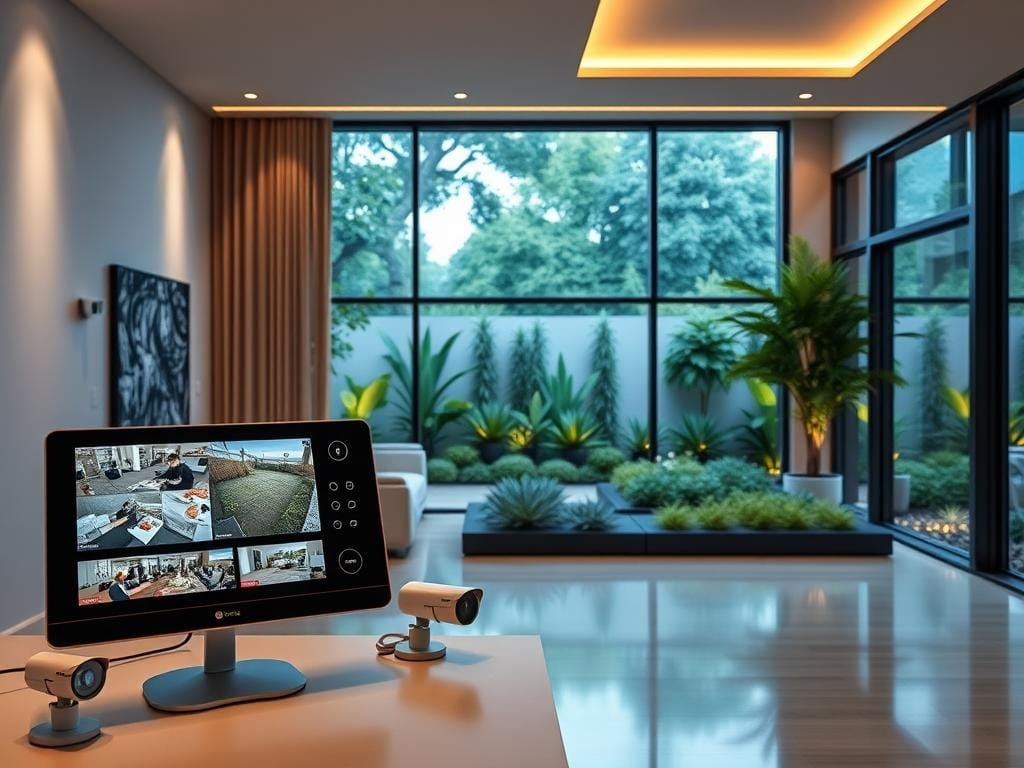
Predictive Analysis for Threat Detection
AI’s biggest plus in home security is its ability to predict threats. It looks at patterns and behavior to guess when something might go wrong. This way of thinking is a big change, letting homeowners act before a problem starts.
For example, if AI sees someone trying to break in at a weird time, it can warn you. This could stop the intruder. This kind of predictive analysis is something old security systems can’t do.
Learning Patterns to Enhance Security
AI gets better at spotting and stopping threats as it learns from data. It works with Home Automation devices to make a whole security system that gets better over time. This system can adjust to what you need.
| Feature | Traditional Security | AI-Enhanced Security |
|---|---|---|
| Real-Time Analysis | No | Yes |
| Predictive Threat Detection | No | Yes |
| Pattern Learning | No | Yes |
AI security systems have big advantages over old methods. For more on how AI is changing home security and automation, check out Digital Vista Online.
Types of Smart Home Security Devices
When you think about making your home safer, it’s key to look at the different smart security devices out there. Today’s AI-powered systems work well with other smart home gadgets. This gives you a complete security experience.
Smart Cameras and Their Features
Smart cameras are a big part of any smart home security setup. They let you watch your home live and check in from anywhere. Some cool things about smart cameras are:
- High-definition video quality
- Night vision capabilities
- Motion detection alerts
- Two-way audio communication
These features help you watch over your place, get alerts for any movement, and even talk to people at your door.
Smart Door Locks and Access Control
Smart door locks add more security by letting you control who gets in. With these locks, you can:
- Let family or guests in from afar
- Get alerts when someone comes or goes
- See who’s been in your home
These locks work with other smart devices to make your home even safer.
Alarm Systems and Sensors
Alarm systems and sensors catch intruders and tell you about any odd activity. These can include:
- Door and window sensors
- Motion detectors
- Glass break sensors
If something looks off, the system can sound an alarm, send you a message, and even call the cops if needed.
Using these devices together, you can build a strong Intrusion Detection System. It offers top-notch Smart Home Monitoring.
Integrating Smart Security with Home Automation
You can make your home safer by linking your smart security system with other devices. This makes your security setup easier to use and manage. It lets you keep an eye on your home more efficiently.
Seamless Connectivity with IoT Devices
The Internet of Things (IoT) has changed how devices talk to each other. By linking your smart security system with IoT devices, you get better security. For example, your smart door locks can work with your security cameras for a fuller view of your home’s safety.
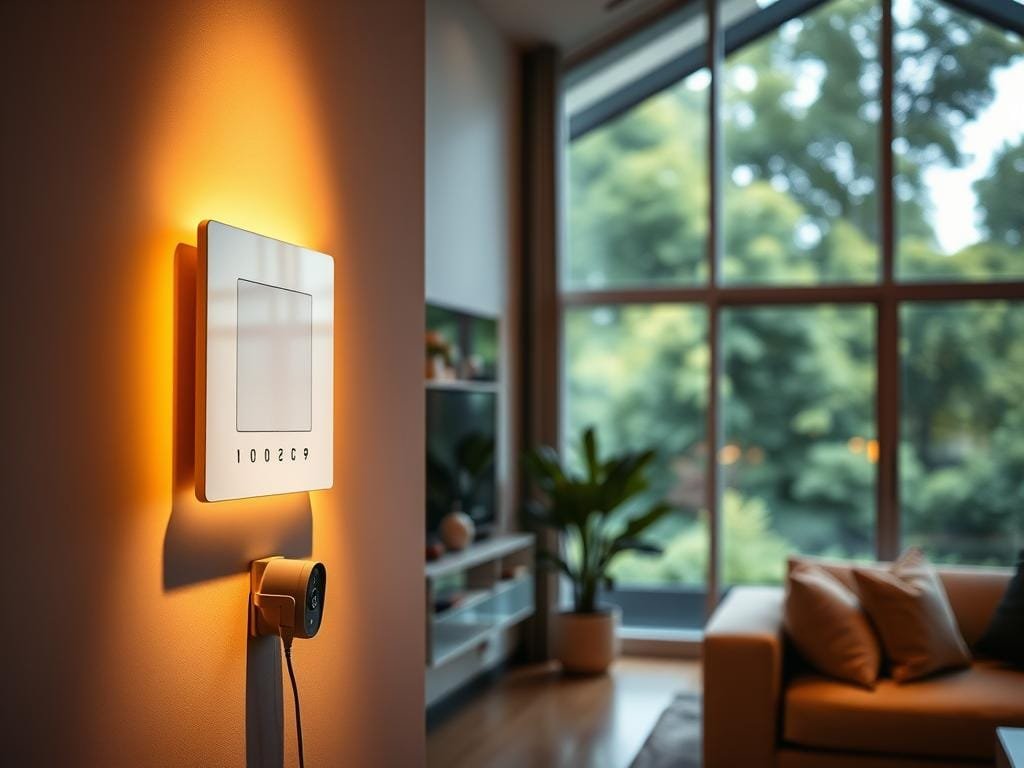
Customizing Your Security Ecosystem
Integrating smart security with home automation lets you customize your system. You can pick which devices to link, how they work together, and how they react to different situations. For instance, you can set your system to turn on lights and cameras when someone rings the doorbell.
This customization helps you make your security system fit your needs. It makes your home more secure.
With Remote Access Control, you can manage your home’s security from anywhere. This is super helpful when you’re not at home. It lets you check on things or adjust your security settings easily.
Personalizing Your Smart Home Security System
Home automation has made personalizing your security system easy. You can now tailor your smart home security to fit your lifestyle. This ensures you’re always protected without unnecessary intrusions.
Identifying Your Security Needs
The first step is to identify your specific security needs. Think about your home’s layout, entry points, and areas you want to monitor. For example, if you have a big backyard or basement, you might need more cameras or motion sensors.
- Assess your home’s perimeter and identify any vulnerabilities.
- Consider how your daily routine affects your security needs.
- Think about any past security incidents or concerns.
Setting Up Alerts and Notifications
Smart home security systems offer real-time alerts and notifications. You can set these up based on the type of activity detected, like motion at the front door. This ensures you’re always informed about your home, whether you’re there or not.
Customizing your alerts helps reduce false alarms. You can get notified when your children arrive home from school or when someone enters a restricted area.
Choosing the Right Devices for Your Home
Choosing the right smart home security devices can be overwhelming. But, by understanding your needs and what different devices can do, you can make good choices. For example, a smart doorbell with a camera is great for areas prone to package theft.
- Smart cameras for monitoring key areas of your home.
- Smart door locks for better access control.
- Motion sensors and alarm systems for full security coverage.
By personalizing your smart home security system, you get better protection and peace of mind. Whether it’s identifying your needs, setting up alerts, or choosing devices, modern security systems give you control.
The Benefits of Remote Monitoring
Being able to watch your home from afar is a big plus of smart home security systems. Thanks to AI, you get updates right on your phone. You can see live camera feeds, check activity logs, and control other smart features.
24/7 Access to Your Home’s Security Feed
With 24/7 access to your home’s security feed, you can always keep an eye on it. This is thanks to wireless security cameras that send live video to your devices. You can check on your home anytime, whether you’re at work, on vacation, or just out.
Responding to Alerts in Real-Time
Smart security devices not only watch your home but also alert you to any odd activity. If something suspicious is spotted, you get a quick alert on your phone. This lets you act fast, whether by calling the police or checking the situation yourself.
| Feature | Benefit |
|---|---|
| Live Camera Feeds | Monitor your home in real-time |
| Real-Time Alerts | Respond quickly to possible threats |
| Activity Logs | Keep a record of all security events |
Using these features can make your home safer and give you more peace of mind. Adding Smart Security Devices to your system is a big step towards a safer, more connected home.
Privacy and Ethical Considerations
The rise of AI-powered home security has sparked a conversation about safety and privacy. When you invest in Smart Home Monitoring systems, think about your personal data and privacy.
Data Security and User Privacy
AI-powered home security systems address data security concerns. They offer encrypted storage solutions to protect your data from unauthorized access. It’s important to know how your data is stored and who can access it.
For example, some systems use end-to-end encryption. This means only you and those you authorize can view footage or access data. Always check the privacy policy of your Connected Home devices to see how your data is used.
| Data Protection Feature | Description | Benefit |
|---|---|---|
| End-to-End Encryption | Ensures data is encrypted from the device to the storage | Protects against unauthorized access |
| Two-Factor Authentication | Adds an extra layer of security for account access | Reduces risk of account compromise |
| Regular Software Updates | Keeps devices and systems secure with the latest patches | Prevents exploitation of known vulnerabilities |
Who Has Access to Your Data?
It’s important to know who has access to your data. This includes the company providing the security system and any third-party services. Always review the terms of service and privacy policies to understand data sharing and use.
For more insights on balancing privacy and protection in home security, check out this detailed analysis on balancing privacy and protection.
In conclusion, AI-powered home security systems enhance safety but raise privacy and ethical concerns. By understanding data security and who has access to your data, you can protect your privacy.
Common Concerns About Smart Home Security
Thinking about getting a smart home security system? You might wonder if it really works and if it’s safe. AI-powered systems are made to spot real threats and avoid false alarms. But, they’re not perfect and can have risks.
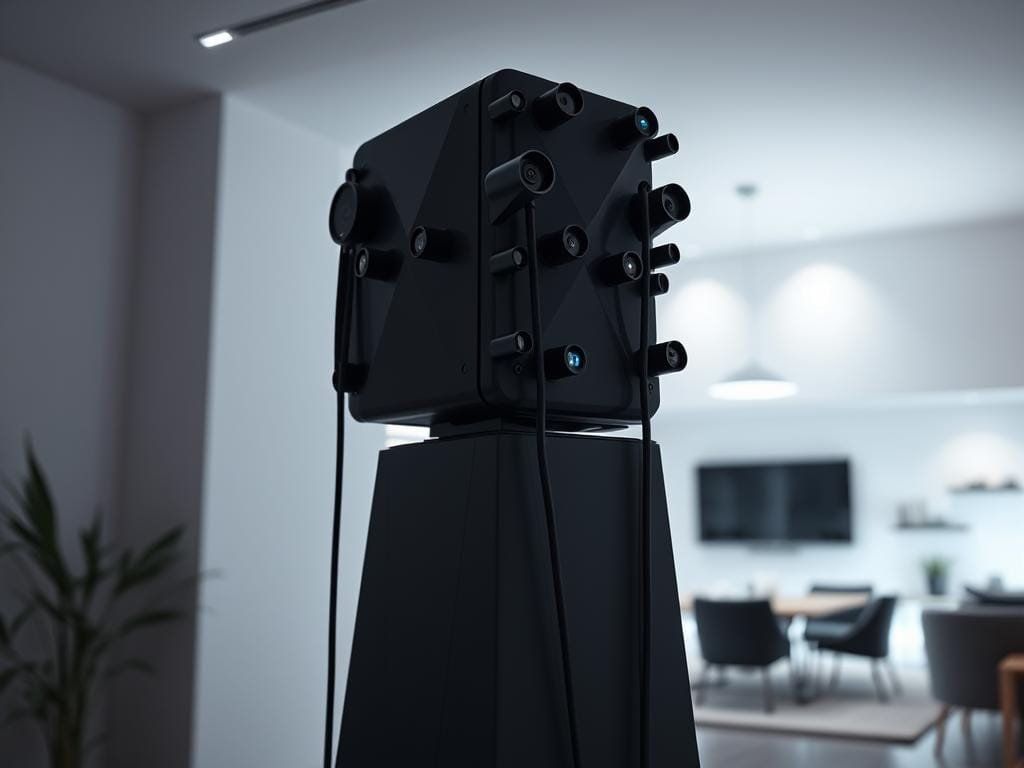
Vulnerabilities and Risks
Smart home security has its downsides. You might worry about cybersecurity threats like hacking. Or technical issues like connection problems or broken equipment.
Choosing a trusted smart home security provider is key. They should focus on keeping your data safe and have strong Intrusion Detection System features.
Debunking Myths About Smart Security Technology
There are myths about smart home security that need clearing up. Some think these systems are too hard to use. Others doubt their ability to catch threats.
But, many smart home security systems are easy to use. They offer Remote Access Control so you can check and control them from anywhere. AI-powered systems are also good at spotting threats, cutting down on false alarms.
Knowing the truth about smart home security helps you decide if it’s for you.
Choosing the Right Smart Home Security Provider
Finding the right smart home security provider is key to keeping your home and family safe. With technology playing a big role in home safety, picking the right provider is important.
Comparing Features and Pricing
When looking at smart home security providers, compare their features and prices. Think about the devices they offer, like cameras and door locks. Make sure they fit your security needs.
- Evaluate the range of devices offered and their compatibility with your existing smart home ecosystem.
- Consider the cost of the system, including any monthly or annual fees for monitoring services.
- Look into additional features such as AI-powered threat detection and remote monitoring capabilities.
Customer Reviews and Ratings
Customer reviews and ratings give insights into a provider’s performance and reliability. Check out reviews on independent platforms for a balanced view.
For more info on top smart home security systems, visit PCMag’s review section. They offer detailed comparisons and ratings.
Installation and Support Services
The quality of installation and support services is vital. Professional installation ensures your system works right. Good customer support helps fix problems quickly.
- Check if the provider offers professional installation services or if the system is designed for DIY setup.
- Evaluate the quality of customer support, including availability, response times, and helpfulness.
- Consider the warranty and maintenance options provided for the system and its components.
By looking at these factors, you can pick a smart home security provider that meets your needs now and in the future.
Future Trends in Smart Home Security
Smart home security is set for big changes thanks to AI and machine learning. The AI market is expected to hit USD $305.90 billion by 2024. It will grow at 15.83% each year until 2030. This growth will shape the future of smart home security systems.
Advancements in AI and Machine Learning
AI and machine learning will change smart home security a lot. They will help systems predict and stop threats better. For example, AI cameras can now tell the difference between friends and strangers, cutting down on false alarms.
Expect more advanced Smart Security Devices that work well with other smart home gadgets. For more on smart home security’s future, check out CSP Alarm Systems for the latest trends.
Emerging Technologies in Home Security
New tech like IoT, blockchain, and 5G will also change smart home security. IoT devices will make security systems more connected and automated. Blockchain will make data safer, and 5G will make connections faster and more reliable.
Here’s a quick look at these new techs and how they’ll impact smart home security:
| Technology | Potential Impact |
|---|---|
| IoT | Enhanced integration and automation of security devices |
| Blockchain | Improved data security and privacy |
| 5G | Faster and more reliable connectivity for smart devices |
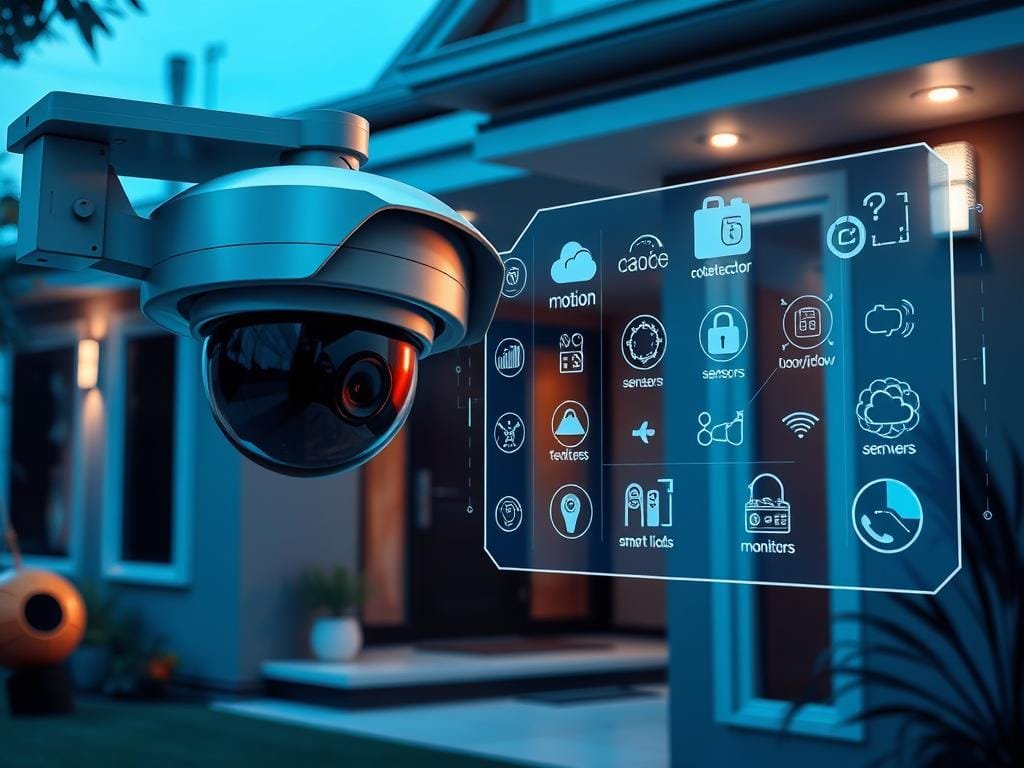
The future of smart home security is about more than just better systems. It’s about creating a smarter, more connected security system. As these techs improve, your smart home security will get better and easier to use.
Conclusion: Enhancing Your Home’s Security with AI
When thinking about improving your home’s security, adding AI to your Connected Home system is a smart move. AI-powered cameras can tell the difference between people you know and strangers. They also watch for unusual movements or sounds, sending alerts to your devices.
Getting a Smart Home Monitoring system means your home is always being watched. For more on how AI is changing smart homes, check out this article. It goes into how AI is making homes safer and more energy-efficient.
Smart Security for a Safer Tomorrow
AI-driven security systems can spot and stop security threats before they happen. They watch for things like strange activity at odd times or in places they shouldn’t be. This shows how fast technology is moving forward.
Using AI for smart home security keeps your home and family safe. It’s not just about protecting your home. It also helps make your whole community safer.
FAQ
What is smart home security, and how does it work?
Smart home security uses advanced tech like AI and IoT devices to protect your home. It connects various devices, like cameras and locks, for a complete security solution.
How does AI enhance home security systems?
AI boosts home security by predicting threats and learning to improve security. It makes devices work better, alerting homeowners in real-time.
What are the key components of a smart home security system?
A smart home security system includes cameras, locks, alarms, and sensors. These devices work together for a strong security system that fits your needs.
Can I integrate my smart security system with other smart home devices?
Yes, you can link your smart security system with devices like lights and thermostats. This creates a seamless, automated home experience.
How do I personalize my smart home security system?
To personalize your system, identify your security needs and set up alerts. Choose the right devices for your home. This creates a security solution that fits you.
What are the benefits of remote monitoring for home security?
Remote monitoring lets you see your home’s security feed anytime. It gives you peace of mind when you’re away and helps you act fast in emergencies.
How do smart home security systems address data security and user privacy?
These systems use strong encryption and access controls for data security. Reputable providers keep your data safe and only let authorized people see it.
What are the common concerns and myths about smart home security?
People worry about vulnerabilities in connected devices. But, choosing trusted providers and following security tips can help. Debunking myths about AI and smart tech can also clear up concerns.
How do I choose the right smart home security provider?
Compare features and prices, read customer reviews, and check installation and support. This helps you find a provider that fits your needs and budget.
What are the future trends in smart home security?
Future trends include better AI and machine learning, and new tech like biometrics and blockchain. These advancements will make smart home security even better.
